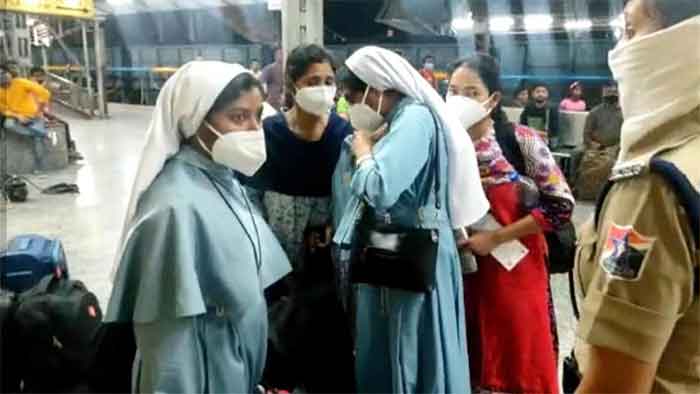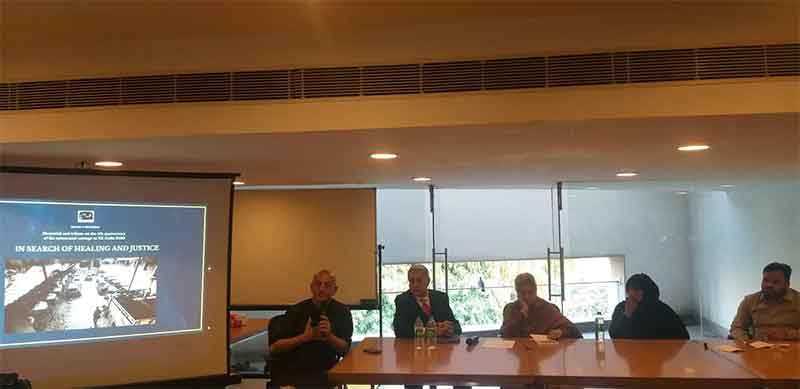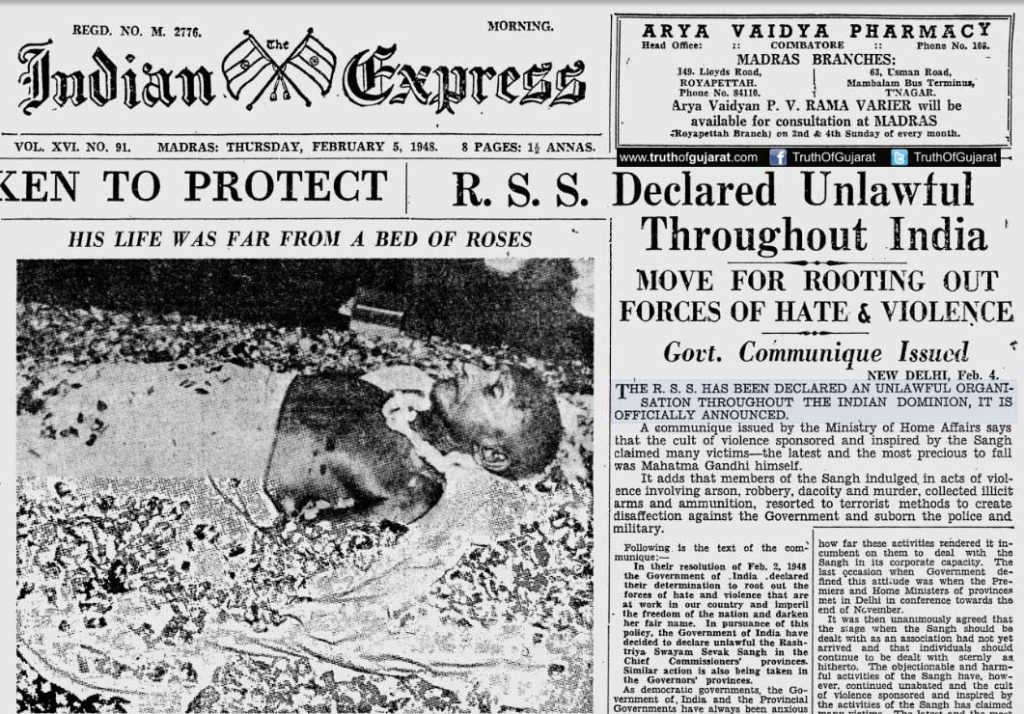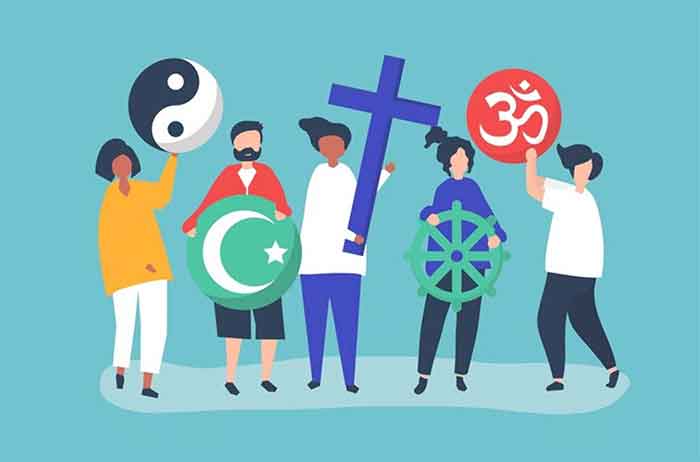
Are we losing the “in-built” measures of modernity in the religious minorities’ struggle for reclaiming equal and free space in India? The answer rests in the response of India’s religious minorities to the state of its shrinking democracy.
Four Christian women including two nuns were travelling together in a group by Utkal Express from Delhi to Odisha on 19 March, 2021. A nasty incident took place at Jhansi station. The co-travellers associated with ABVP, a right-wing all India student organization under the ideological umbrella of Hindu nationalist Rashtriya Swayam Sevak Sangh (RSS) interrupted in the conversation of women. They harassed them verbally. They accused the nuns of “forcefully converting” the other two girls. The railway police intervened but they along with the members of ABVP forced the four women off the train. The video of this incident was circulated in social media. It invoked disgust and anger in Kerala, the home-state of women in particular and across India in general. According to the report published by Indian Express on 26th March, Anchal Arjariya, a Vishva Hindu Parishad (VHP) leader in Jhansi had demanded vigilance against Christian nuns at the local police station. I do not go deep into the matter of investigation here. My aim here is to throw light, mainly, on the response of AJ Philip, a Christian journalist and, partly, on my response to the human condition in modern times.
I come from a Dalit ethno-linguist caste minority in Gujarat. I have been travelling by train across India. I like to talk to people in journey. There is not a single instance where I have not been asked about my caste identity while engaging in conversation with the co-travellers in the train. Earlier I used to hide my caste. I was afraid of what the other co-travellers would think of me for belonging to a caste lowest in the social hierarchy. I doubted they would speak to me in biased terms. It has been a while for me to unlearn self-hate and to inculcate self-confidence against caste mentality.
When I observe the recent incident of attack on a minor Muslim boy and harassment to the Christian women by Hindutva Nazis, it becomes more visible that a journey started by Dalit, Adivasi and religious minorities is also a journey of social risks and challenges. Nevertheless, it is a journey of their self-exploration against oppressive forces as a matter of long process. Such a journey may allow them a chance to witness their unique self-identity across the questions of caste, religion, gender, language, ethnicity, etc. It brings an opportunity to them for understanding newness about their identities. Such personal journey always takes time because the stigma associated with minor identities is imposed on the minds of people deeply for a long period of time, the beauties of these identities are erased, the violence underlying the stigma is deeply embedded in the structural reality, and also because such forms of violence are normalized due to lack of sensitivity among co-travellers. The lives of religious minorities are part of Indian society which stand for train here as one of the important features of Indian modernity.
The incident of harassment and humiliation on the four Christian women and disregard by the state has been condemned by human rights activists and the All India Catholic Union (AICU). Pinarayi Vijayan, the Chief Minister of Kerala, expressed shock and has demanded investigation against the culprits. Amit Shah, the Home Minister of India promised to the people of Kerala that the offenders would be punished soon during his election campaign there. But the reason for the neglect can be marked in the words of Arjariya, the one who complained of the four Christian women to the Jhansi police. According to report of Indian Express, Arjariya was confident of suspecting the Christian nuns for forcing the two other girls to convert. It was his duty as Indian to report someone or something he suspects in the public spaces. He argued that the incident was made an issue to get mileage in the on-going election against BJP in Kerala. AJ Philip, a senior journalist and columnist in his letter to Amit Shah makes it clear that the other two girls are “born in Christian families” and were baptized in childhood. They are “postulants” under training to become nuns. The nuns were on the way to drop them at their homes in Odisha before getting almost “kidnapped” by the “RSScals” at the Jhansi station. I wonder how Dalit, Adivasi and religious minorities struggle to carve out space for self and community in society full of contradictions and conflicts? How they propose an ideal world against threat to dignity?
The said incident is certainly significant in the political memory of minorities. It captures the moment of feeling bahiskrit (outsider) to social system of India. It marks the moment where one is caught by his/her image of an “Other” of the imposed Hindu self. M.K. Gandhi experienced it but in the context of white supremacy. It made deep impact on his psyche in the history of national leadership at home. But he failed to understand what it could mean for a man and woman, belonging to Dalit, Adivasi and religious minorities, to travel/progress in the future of caste society. In contrast to Gandhi’s experience, the struggle to live with self-respect is demonstrated well in the life of B.R. Ambedkar. Ambedkar struggled to find space for stay at Baroda and found not worthy of it despite of his high stature before entering to politics. In his essay, “One Step Outside Modernity,” Prof. M.S.S. Pandian rightly argues that for the minorities to move ahead of Indian modernity is to keep one step outside it (1735). Like Gandhi, Ambedkar did not choose to sit in the middle of people and enchant them by a saintly charm in the sheer province of divinity. As a man of modern institutions, Ambedkar addressed Hindu society as the “chamber of horrors” and stood one step outside Indian modernity to move ahead in his pursuit of egalitarian society. In his book, State and Minorities (1947), he wanted Dalits to convert into Buddhism. Projecting Dalit community as Buddhist resists Hindutva and offers an alternative to its majoritarian inclination. In their article, “What is Public?” J. Scott and Brannon Ingram notes Ajay Skaria’s view on Ambedkar’s conversion into Buddhism. According to Skaria, Ambedkar struggled to materialize Buddhism in a “civil religion” based on human rights on the one hand and positioned “Dalit as a minor figure” (366). Dalits are succumbing no more to Hindutva after witnessing rapid violence against minorities especially after 2014. Acceptance of Buddhism among Dalits has increased in this background. The Rohith Vemulla movement in the University of Hyderabad and the Una Dalit Struggle in Gujarat mark a new awakening of self-respect in Dalit community. Many young Dalits have started to feel abused by their identity as Hindu on the caste-certificate unlike before. Given the rapid violence against Dalit, Adivasi and religious minorities, the question arises: are we losing the “in-built” measures of modernity in the minorities’ struggle for reclaiming equal and free space? The answer rests in the response of religious minorities. The response is significant for a shrinking democracy of India. The religious minorities preserve the “in-built” measures of modernity, which can be marked and understood in the letter by AJ Philip. Philip posted his letter to Amit Shah, the Home Minister of India on his Facebook page on 26th March 2021. It was republished by Sabrang news media on 29th March, 2021. I follow a close reading of some of the parts of his letter here.
The letter clearly reflects Philip’s anger against the foot-soldiers of RSS but concern for the country in his wise use of the words. Philip comes from a Christian background in Kerala. He is Chief-Executive-Officer at Deepalaya, an NGO that works for children. It is because of his religious background, training and a long experience in the field of journalism and social service, he writes a long letter to the Home Minister of India.
In his letter, Philip throws light on the events of attack against religious minorities by the blind “defenders of Hindu faith” in Uttar Pradesh. He expresses his sentiments on witnessing such incidents. Against such antagonistic climate, he writes about his visits to the Christian institutions and his interviews with the Christian nuns. He elaborates on the real identity of Christian nuns. He writes that they “as teachers, nurses, doctors, social workers, and even lawyers” find relief in service to the millions of needy people in remote places of India. Philip makes clear that the actions of Christian nuns should be understood as part of the history of service to the people affected by war, poverty and illiteracy in a multi-religious country like India, and also in a religious country like Iraq. I come from a village in Narmada district of south Gujarat. I used to visit Christian hospital with my mother to seek remedy from Christian nuns as nurses and doctors in childhood. Their contribution to the education of Adivasi boys and girls can be marked in the well-organized infrastructure of missionary schools and quality education in the villages of south Gujarat.
Philip starts his letter with an address, “Dear Amit Shah Ji” and ends with “Yours etc…” to put larger emphasis on the issue under consideration and lesser on himself. The letter demonstrates his close relation with the minor communities. Philip enacts the writing of his letter in the world of religious minorities. He persuades Shah not to forget that he too belongs to Jain, a religious minority in which “Digambar Jains are allowed to travel without any piece of cloth on them.” He asks Shah to “feel” for his “Jain Muni” in case the latter is “forced to cover his genitals” by the bigots of RSS ideology in a public space. He illustrates the fact that the Christian nuns were harassed by UP police for wearing a full-length Christian garment in the state of a BJP Chief Minister who also wears his own religious dress in saffron.
Philip invites Shah “to imagine for a moment” “the agony” on being “forced to break the journey” amidst the busy hours of his election campaigns in different parts of India. He brings to the Home Minister’s notice the nature of harassment to religious minorities. He indicates that the nature of humiliation against religious minorities is not only physical but also emotional and spiritual. In his use of words, “forced to break the journey” the letter exposes the current crisis of social democracy in India. The minorities are constantly forced to get off a train of social progress. The train of social progress looks “modern” “secular” “cosmopolitan” “multi-cultural” in the garb but it embodies a Hindu locomotive engine at its front and parochial seats inside its coach.
Philip puts facts against Shah. He mentions that the Christians “constitute less than 3 per cent of the population” and are “the most law-abiding” people in India. He then juxtaposes these facts with fiction. He questions Shah why the RSS led BJP ministers tend to create fear of the religious minorities in the minds of common people. He challenges Shah to show guts against the politics of RSS. He advises him to protect religious minorities against Hindu bigots in UP and the police.
Philip does not succumb to the narrative of victimhood in his letter. He plays out with the historical figure and mythical character both. He suggests Shah that the women are not powerless citizens and his inaction as Home Minister against atrocities on religious minorities might lead the country to the stage of resistance. The women imbibe memory of resistance. He does not compare humiliation the Christian nuns suffered with the revolt of 1857. But he contextualizes the matter of Christian women in historical context of Jhansi because they were forced to get down the train at Jhansi railway station. Philip makes the issue symbolic and mentions Jhansi as “the same place where a queen unleashed her sword against the British” in the struggle of freedom for the first time in India. He alerts Shah of “the wrath of God, as had happened at the Kaurava court when Draupadi was disrobed.” His use of these reference alludes that women are endeared to their communities and torture on them can invoke anger in their community against Hindutva hooligans.
The language of oppressed resonates with Ambedkarism which is more than electoral victory. It seeks to cultivate mind intellectually and civilize social relation which is marred by the “monster” of caste. The Ambedkarite agency of minorities invites the opponents to share feeling of fellowship with minorities and participate in the movement against caste-hierarchy and fascism. It is oriented to recreation of new and dynamic space. This is evident in AJ Philip’s letter to Amit Shah in particular and the response of religious minorities in general against the politics of Hindutva. The resolution passed by the Shiromani Gurudwara Prabandhak Committee (SGPC) against RSS makes it clear that the religious minorities—Sikhs, Christians, Buddhists and Muslims—stand against the scriptural sovereignty of Hindutva and fight for the constitutional sovereignty of Ambedkarite principles of humanity.
Dipak Barkhade is a Senior Research Scholar, Center for Comparative Literature, School of Humanities, University of Hyderabad
GET COUNTERCURRENTS DAILY NEWSLETTER STRAIGHT TO YOUR INBOX















































